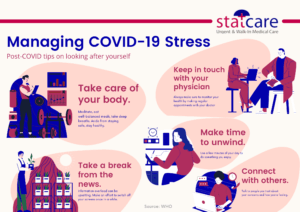In the United States, more than 4 million young children have tested positive for COVID-19. A SARS-CoV-2 infection can cause a lot of symptoms, ranging from mild to severe. So far, there are no instances showing that children and teenagers do not experience more serious sickness than adults.
But there are records of patients that develop long-term effects, even after recovering and testing negative from COVID-19. People who do experience lingering complications are often labeled as “long haulers”.
The syndrome that involves long-term consequences of Coronavirus infection is also called long COVID. Popular persistent symptoms of long COVID affecting people may include difficulties in physical or mental activities.
Cause of Long COVID-19
Experts don’t have a definitive answer yet. Some people’s immune systems may go into a frenzy as a result of the infection, targeting not just the virus but also their own cells. This is something that can occur in persons who have extremely powerful immune responses.
There are several theories to consider. Some speculate that the symptoms are the result of a live virus reactivating in the body. Others say it’s an autoimmune disorder, in which the body attacks itself. Another guess is that it is caused by a weakened immune system or one that has been thrown into chaos by the initial infection.
According to the Centers for Disease Control and Prevention (CDC), common lingering symptoms include:
- Respiratory difficulties
- Fatigue
- Brain fog
- Cough
- Chest pain
- Headache
- Palpitations
- Abdominal pain
- Diarrhea
- Insomnia and other sleep difficulties
- Fever
- Lightheadedness
- Joint pain
- Pain
- Rash
- Mood changes
- Menstrual cycle irregularities
Some of these may be due to the virus itself, penetrating and destroying our cells. Injury to blood vessels, in particular, could lead to heart, lung, and brain issues.
Some other idea is that virus pieces might remain in the body, staying inactive for a time before being resurrected. At present, there isn’t much indication that this is what’s happening with the COVID-19 virus. To generate such a wide range of issues, it’s possible that multiple different things are going on in multiple individuals at the same time that can be the cause of long COVID-19.
Who is Most Likely to Experience Long COVID?
According to doctors, it is difficult to identify who’s most likely to experience long COVID since this was just recently discovered. However, recent studies show that experiencing long COVID may factor in a person’s age and are twice as common to women than men. Also, those who have pre-existing conditions and were hospitalized because of Coronavirus have higher chances of suffering from long COVID.
According to King’s College London, 1-2 percent of those infected in their 20s would have lengthy COVID, as compared to only 5% of those in their 60s. These results may occur because the long-term effects of COVID-19 have a huge impact on their bodies. It is also most likely that older people were vaccinated and protected first than the younger ones.
Long COVID is still a relatively new disease, and researchers are still attempting to figure out why it affects some individuals but not others, as well as how to treat it.
In recovering patients, it was observed that some of them have symptoms of long COVID which most likely can be severe than the previous infection. While some experienced long-term effects such as coughing, fatigue, shortness of breath, and loss of taste, amongst others.
Should patients be worried about the possible long-term effects of COVID-19? The answer is always to be vigilant and mindful of your body. Always observe yourself especially if you have pre-existing conditions.
Young People and Long COVID
Young people are less prone than adults to catch COVID-19 and, as a result, to get long COVID. However, recent cases seem to show that some do.
Leading specialists, on the other hand, are optimistic about the likelihood of long-term COVID in young people after the latest research found that long-lasting symptoms are less frequent than previously thought. According to some early predictions, only up to half of all young people infected with Coronavirus might have long COVID.
Indeed, the danger to young individuals, according to the researchers, is “not insignificant”. It’s critical that youngsters, who are still experiencing headaches, fatigue, or breathing problems, get medical help as needed.
Evaluation for Post-COVID Conditions
The CDC recommends that follow-up appointments for recovering COVID-19 patients should be done ideally within 1–2 weeks after hospital discharge. Also, the patients should have a clear understanding of how to take their medication before, during, and after hospitalization.
A thorough physical examination should also be included in the advice on how to properly recover from COVID-19. If a patient experiences 1 or 2 lingering symptoms associated with long COVID, immediately call the doctor for advice and for an appropriate post-COVID medical management plan. It is also best to get in touch with the local urgent & walk-in medical care near you, like Statcare in New York City, for faster and smoother medical assistance.
Follow Up Check-Up for Those Treated in an Outpatient Set-Up
Following their initial infection, some people who were asymptomatic or slightly to moderately unwell with COVID-19 may acquire new, continuing, or worsened symptoms and illnesses. An antibody test can be done to identify a history of COVID-19 infection. It is important to keep in mind that some people with COVID-19 will not experience or show any kind of symptom relative to the infection.
Recommended COVID-19 Prevention Measures
For those who recovered from COVID-19, a continued follow-up check-up should be maintained. Also, make sure to follow CDC’s recommended COVID-19 prevention measures, such as wearing a mask, maintaining social distance, regular washing of hands, avoiding crowds and closed spaces, and getting vaccinated.
Precautionary Care
Reviewing your personal precautionary care should benefit you. Always observe safety practices and make sure that preventive health tests or screenings are always up to date. Stay updated with COVID-19 vaccine details and other discussions about healthcare (nutrition, physical activity, stress management, and interpersonal relationships). These should be managed accordingly with the help of your family members and/or health care experts.










